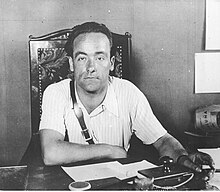Juan García Oliver
Juan García Oliver (born January 20, 1901 in Reus , † July 13, 1980 in Guadalajara , Mexico ) was a Spanish anarchist and syndicalist . During the Spanish Civil War he was Minister of Justice of the Second Republic .
Life
García Oliver was born into a proletarian family. At the age of 11 he started working in the wine trade. Later he worked as a cook and above all as a waiter. In 1919 he joined a waiters' union, in which he campaigned for the connection to the Confederación Nacional del Trabajo (CNT). In 1920 the CNT sent him to Reus to organize the workers there. In 1921 he was a member of the CNT Committee of the Tarragona Province . During this period he was detained several times for his union activities.
Juan García Oliver was a close companion of Buenaventura Durruti with whom he founded the anarchist action group Los Solidarios (1922). In the 1920s he was on the run through various countries in Latin America and Europe for a few years. In 1928 he was sentenced to ten years in prison in Spain. After the proclamation of the Second Republic in 1931, García Oliver was freed. Together with Durruti, Francisco Ascaso and Gregorio Jover , he has now founded the anarchist group Nosotros , which joined the Federación Anarquista Ibérica (FAI).
At the beginning of the 1930s, García Oliver played a leading role in the dispute over the strategic direction of the CNT. At the CNT congress in Madrid in 1931 , in which he participated as a delegate for the syndicates from Reus and the surrounding area, he spoke out against the u. a. by Juan Peiró defended introduction of industry federations and for maintaining the professional unions. The congress decided to introduce the industrial federations. In the same year García Oliver became secretary general of the FAI. In this role he decisively formulated the position of the FAI-oriented current within the CNT, which should rely on the spontaneity of the masses and carry out the social revolution as directly as possible. In doing so, he positioned himself against the Trentistas , for whom adequate preparation and training of the labor movement was an absolute condition for the success of the social revolution. After the FAI faction prevailed in this internal power struggle, García Oliver became editor of the CNT newspaper in 1933 .
Juan García Oliver participated on July 19, 1936 in Barcelona in the armed resistance against the military coup and the social revolution that now gripped parts of Spain (especially Catalonia ). Afterwards he campaigned for the immediate proclamation of libertarian communism, in case of doubt also against the resistance of the other anti-fascist factions. With this position he could not assert himself within the CNT and the FAI. Instead, the libertarian movement relied on the anti-fascist united front . She took part in the Central Committee of the Antifascist Militias , initiated by the Catalan President Lluís Companys i Jover , in which representatives of all anti-fascist unions and parties sat. In the first months after the military coup, the committee took over the role of the Catalan government. There García Oliver was responsible for the defense department , i. H. the warfare, responsible. After the committee was dissolved in September 1936 under pressure from the central government, he was responsible for the same department as a member of the newly established National Council of Catalonia.
When the CNT entered the central government under Largo Caballero on November 5, 1936 , García Oliver took over the office of Minister of Justice. Other CNT ministers were Juan Peiró (Industry), Federica Montseny (Health) and Juan López Sánchez (Commerce). García Oliver remained in office until May 18, 1937, when the May events heralded the end of the Caballero government. During this civil war in the civil war , he and Montseny called in Barcelona the libertarian workers to lay down their arms, as the anti-fascist unity was a prerequisite for winning the war and saving the revolution. Many members of the libertarian movement interpreted this as a betrayal of the revolution by the two anarchist ministers.
After his defeat in the civil war in 1939, he went into exile to Sweden with the support of Helmut Rüdiger and the Sveriges Arbetares Central Organization (SAC) before settling in Guadalajara (Mexico) in 1941. In 1978 he published his autobiography El eco de los pasos ( The echo of the steps ). Juan García Oliver died in 1980 at the age of 79.
Fonts
- El facismo internacional y la guerra antifascista española . 1937.
- Mi gestión al frente del Ministerio de Justicia . 1937.
- The eco de los pasos . 1978.
literature
- Walther L. Bernecker : Anarchism and Civil War. On the history of the social revolution in Spain 1936–1939 . Verlag Graswurzelrevolution , Nettersheim 2006. ISBN 3-939045-03-9 .
- Heleno Saña : The Libertarian Revolution. The anarchists in the Spanish Civil War . Edition Nautilus , Hamburg 2001, ISBN 978-3-89401-378-3 .
Web links
- Speech by Juan García Oliver during the inauguration of the mausoleum for Durruti, Ascaso and Francisco Ferrer Guardia (1937). ( YouTube video).
| personal data | |
|---|---|
| SURNAME | García Oliver, Juan |
| BRIEF DESCRIPTION | Spanish anarchist and syndicalist |
| DATE OF BIRTH | January 20, 1901 |
| PLACE OF BIRTH | Reus |
| DATE OF DEATH | July 13, 1980 |
| Place of death | Guadalajara , Mexico |
